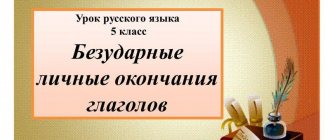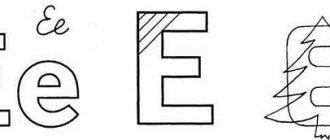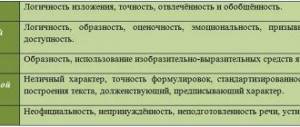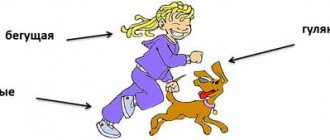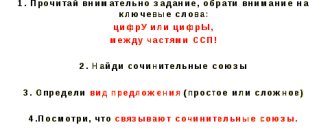Download material
so UNT / Lesson developments / Russian language lessons
Russian language 8th grade. Topic: “Minor members of a sentence. Definition"
23.12.2014 6579 838
Lesson type: workshop
Forms of organizing educational activities in the classroom: individual, pair, group, frontal.
The purpose of the lesson:
systematization and analysis of mistakes made in trial tests.
Tasks:
Check the level of knowledge acquisition using a system of tasks of various types;
Develop key competencies: speech, attention, memory, logical thinking, ability to generalize, draw conclusions; develop the skills of self-control, mutual control, the ability to work in time; develop the ability to work with UNT tasks, read questions carefully and thoughtfully.
To improve the skills of ethical interpersonal communication, to cultivate a conscious attitude towards language as a cultural phenomenon, to develop control and self-control skills, to intensify cognitive activity in a team and to develop cooperation skills in solving search problems, to cultivate moral and value qualities in students.
Methods and techniques:
according to the nature of students’ cognitive activity: reproductive, problem-based, partially search;
by source of knowledge: verbal and practical;
stimulation and motivation: cognitive, emotional;
intellectual: inductive, deductive, comparisons, classification of material;
control and self-control: oral, written, self-control and mutual control;
on the organization of activities: individual, paired and frontal.
Equipment: textbook, tables, task cards, tests, lesson epigraph, handouts, interactive whiteboard, trial testing summary table, lesson worksheet.
I believe in our youth, I am sure that your knowledge, your energy and your work will work to build a strong and prosperous Kazakhstan.
N. Nazarbayev
DURING THE CLASSES:
Organizing time. Psychological mood.
Teacher's word: Today we have a lesson in preparing for the UNT. Teacher: The topic of our lesson today is “Minor members of a sentence.” We will talk about the role of minor members in a sentence, remember the information about the minor members of a sentence that you know from the 5th-7th grade course, and get acquainted with the types of definitions.
The motto of our lesson will be the words:
“I know I can do this. Let's master it together"
Teacher: you each have an assessment sheet, where you will rate yourself after each completed work, and at the end of the lesson we will sum up the results.
Updating basic knowledge: First, let’s conduct a “Brainstorm” and remember that we are studying the Russian language.
Brainstorming (questions on various topics)
1) The branch of language science that studies speech sounds? (Phonetics)
2) A conversation between two or more people? (dialogue)
4) Part of a modified word without ending? (the basis)
5.Has two conjugations? (verb)
6. Are there exactly six of them? (cases)
7. Branch of the science of language that studies phrases and sentences? (syntax)
8. A word that names the person being spoken to? (Appeal)
9.Five, six, two, third - is this? (numeral)
10. Is it highlighted in a sentence by a wavy line? (definition)
11.Placed at the end of an interrogative sentence? (question mark)
12.What is the sign of the verbs was, is and will be? (time)
13.How do adverbs change? (do not change)
14.What is the name of the auxiliary part of speech that serves to connect words in a sentence? (pretext)
15.What is another name for the main members of a sentence? (grammatical basis)
16. Does it have three faces? (pronoun)
Orthoepic warm-up.
Teacher: A literate person must pronounce words correctly. Orthoepy teaches us this. I suggest you do an orthoepic warm-up. The cards contain words from UNT variants. Your task is to place emphasis in words within 2 - 3 minutes.
citizen, document, drought, tool, kilometer, shop, youth, briefcase, interest, beets, orphan, began, pamper, oil pipeline, relay, arrive.
Introduction to the topic of the lesson
Teacher: Which sentence conveys more information? Autumn has come. After a sultry summer, golden autumn has arrived.
Teacher: What are the minor members of a sentence?
Teacher: Why are minor members needed in a sentence?
Teacher: Based on the presence or absence of minor members of the sentence, simple sentences are divided into 2 groups. Help me fill out the diagram.
Teacher: What minor members of a sentence do you know?
Teacher: On the screen you see a diagram. Write it down in your notebook. Now we will work with her.
Students rewrite the diagram.
Teacher: How to determine the type of minor members of a sentence?
Teacher: What are the symbols of the secondary members of a sentence?
Student ( suggested answer
): The addition is emphasized by a dotted line, the definition by a wavy line, the circumstance by a dash-dot.
Teacher: What do the secondary members of the sentence mean and what questions do they answer?
Note: At the same time as students answer, the correct options appear on the screen. All students gradually fill out the HCP chart.
Teacher: We remembered the theory. Let's put it into practice.
The sentence is given: “Rain streams rushed down the slopes.” Below you see arrows: horizontal and two vertical. What do they mean?
Teacher: We fill out this conditional diagram orally. Name the subject and predicate.
Note: At the same time as students answer, the correct options appear on the TV screen.
Teacher: Name the minor members of the sentence.
Note: at the same time as students answer, the correct options appear on the screen
Working with a poster.
Teacher: Now let’s make our own posters. Group 1 - sentence: “Yesterday, stormy water uprooted a mighty oak tree.”
Group 2 - “The swans were resting on a small lake near the village.”
Students work independently for 1-1.5 minutes.
Teacher: Let's check your work
Note: the diagram appears on the screen
Teacher: Name the subject.
Teacher: Name the predicate.
Teacher: Which VChPs distribute the subject?
Teacher: Which VChPs belong to the predicate group?
Note: at the same time as students answer, the correct options appear on the screen
Teacher: Let’s take a break and summarize some results. What have we found out about the minor members of sentences? If there is a VChP in a sentence, then this sentence is common.
Consolidation
Teacher: Let's consolidate the topic of today's lesson. Verbally determine the type of identified VChP.
Weeping
the willow stretched its branches towards the water.
( definition
)
Paths
sprinkled with yellow sand.
( addition
)
crystal vase on the display case
. (
definition, circumstance
)
Generalization
Teacher: Now let’s summarize what we’ve learned. We complete the task in writing. Copy the sentences, underline the grammatical basis and definitions, indicate the type of definition.
1 group
White hands love other people's works. (Gr. basis - hands love; agreed definitions - white, alien)
She chose a turquoise dress. (Gr. basis - she chose; definition - turquoise)
The meeting with friends will take place on Saturday. (Gr. basis - the meeting will take place; inconsistent definition - with friends)
2nd group
Golden autumn has arrived.
Swans were flying over the taiga.
The forester brought them home.
Summing up the lesson.
Teacher: So, let's summarize the lesson.
- What did we do in class? (repeated VChP, talked about types of definition)
— What new did we learn today? (what are the definitions)
— Why do we need VChP? (VChP explain, clarify, supplement, extend both the main and secondary members; help more fully and accurately describe objects and phenomena of the surrounding reality; enrich our speech)
— What HCPs do you know? How to distinguish them? (addition, definition, circumstance; VChP can be distinguished by the questions we ask from the word being defined)
— How to distinguish an agreed definition from an inconsistent one?
(definitions also vary by question and way of expression)
- What was the purpose of the lesson?
(remember the information about HCP studied in the course for grades 5–7, get acquainted with the types of definitions)
- Have we achieved our goal? (Yes)
Independent work (checking the effectiveness of the lesson
Teacher: In that case, I suggest you do a little independent work. Read the assignment carefully. Operating time – 3 minutes.
See the downloadable file for the full text of the material.
The page contains only a fragment of the material.
